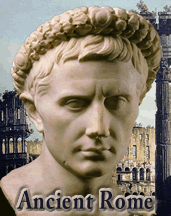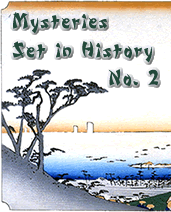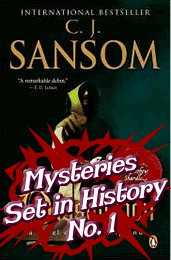Where Goeth Napoleon, So Goeth Ethan:
The Mysterious Misadventures
Of a Likeable Young American
On History's Grand Stage.
By Ron Fritze from Athens, Alabama
Posted on August 17, 2010
If you are not already familiar with the novels of William Dietrich featuring Ethan Gage, I would like to recommend them to you. Dietrichís novels are set at the turn of the century, eighteenth to the nineteenth — tumultuous times indeed. Gage is a young American and a former protťgť of Benjamin Franklin. He is a pleasant and intelligent fellow who manages to get into all sorts of misadventures.
At the beginning of the first novel, Napoleonís Pyramids, Gage is living in Revolutionary Paris of 1798. While not a charming and likeable scoundrel like Sir Harry Flashman (the central character in George MacDonald Fraserís novels), Gage is quite likeable and even well meaning, although he tends to avoid hard work and is prone to gambling and sexual dalliances if the circumstances allow.
A Templar Medallion
Leads Our Hero to Egypt.
Itís the gambling that gets Gage in trouble. The adventures of Napoleon's Pyramids are set in motion when Gage wins a mysterious medallion in a card game and soon realizes that some sinister people want it back. The nasties frame Gage for a murder and he flees Paris.
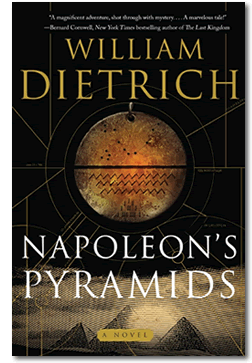 Pursued by mysterious and relentless foes, Gage also receives assistance from Gypsies. Upon reaching the Mediterranean coast, he joins Napoleonís expedition to conquer Egypt as one of the savants accompanying the French army to study the archaeology and natural history of Egypt.
Pursued by mysterious and relentless foes, Gage also receives assistance from Gypsies. Upon reaching the Mediterranean coast, he joins Napoleonís expedition to conquer Egypt as one of the savants accompanying the French army to study the archaeology and natural history of Egypt.
Gage comes to discover that his medallion is a powerful Templar artifact concealing a clue to the discovery of knowledge and wealth. His mysterious pursuers, adherents of a heretical Egyptian rite of Masonry, want the medallion to gain esoteric knowledge they believe will give them great power over other people.
Opponents of the Egyptian rite come to Ethanís aid. One of these allies is a beautiful Egyptian girl named Astiza — and, of course, the two fall in love.
Harrowing and Accurate
Like Harry Flashman, Gage rubs shoulders with various historical people, including Napoleon, Sir Sidney Smith, and Robert Fulton (to name just a few). Also like Flashman, Gage is present at various historical events. Dietrichís descriptions of the Battle of the Pyramids and the Battle of the Nile are historically accurate and make for harrowing tales.
At the moment there are four books in the Ethan Gage series, although I think it is safe to predict that Dietrich will be writing some more — and I look forward to the next installment.
Napoleonís Pyramids covers the French invasion of Egypt along with Gageís adventures in the pyramids and at the ancient temple at Dendara.
Treasures and Esoteric Knowledge
The Rosetta Key takes Gage to Palestine at the time of Napoleonís invasion of that part of the Ottoman Empire. Besides being
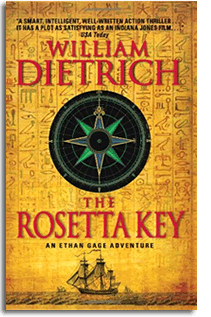 present at the capture of Jaffa and the siege of Acre, the redoubtable Gage manages to dig for treasure and explore the caches of esoteric Templar knowledge hidden under the Temple Mount and among ruins on Mount Nebo. He also hooks up with Sir Sidney Smith, the English adventurer and nemesis of Napoleon in the Middle East.
present at the capture of Jaffa and the siege of Acre, the redoubtable Gage manages to dig for treasure and explore the caches of esoteric Templar knowledge hidden under the Temple Mount and among ruins on Mount Nebo. He also hooks up with Sir Sidney Smith, the English adventurer and nemesis of Napoleon in the Middle East.
Gage manages to make it back to Paris about the same time that Napoleon abandons his army and returns to France, where it appears the crafty general uses some of the esoteric powers uncovered by the Templar medallion to make himself Dictator of France.
At this point, Gage returns to the United States but without Astiza, which is where the third novel, The Dakota Cipher, begins. Back home, he is sent to the Great Lakes to pursue more Templar clues along with other hints of pre-Columbian visitations of North America by Madoc and the medieval Welsh and the Norse. He also meets a rather kinky English brother-and-sister team who are also members of the Egyptian rite. While he manages to survive their murderous attentions along with the dangers of the American wilderness at the start of the nineteenth century, he loses some friends as well.
Weapon of Hot Destruction
The fourth novel, Barbary Pirates, returns Gage to the France of Napoleon. Rumors of a super-weapon of ancient provenance are circulating, so Gage is sent to check it out. He is accompanied by the American inventor Robert Fulton, the Englishman William Smith who developed the science of stratigraphy, and the French naturalist
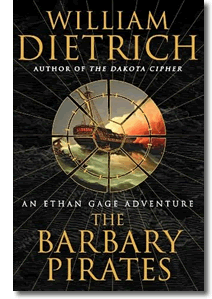 Georges Cuvier. The four men get into a bit of trouble due to gambling and wenching with Ethan Gage leading the way. To get out of trouble, they are pressed into a search for the super-weapon, which is a huge mirror capable of producing a heat ray to burn ships.
Georges Cuvier. The four men get into a bit of trouble due to gambling and wenching with Ethan Gage leading the way. To get out of trouble, they are pressed into a search for the super-weapon, which is a huge mirror capable of producing a heat ray to burn ships.
What I like about The Barbary Pirates is that some of Gageís adventures take place in Venice and on the island of Santorini. Having just visited those places last May, I can attest that Dietrichís descriptions are accurate and evocative. Unlike me, Gage got to visit the ruins of ancient Akrotiri. My visit to Akrotiri will have to wait until my next cruise as the site has closed to the public for a number of years (supposedly due to some personal injury litigation). The ruins were about the reopen when I was there in May but, alas, not early enough for me see them.
Again, Gage searches for caches of ancient knowledge recovered by the Templars. He also discusses the possible Santorini/Atlantis connection. It is hinted that the ancient inhabitants of Santorini were the ones who actually developed the great mirror for the heat ray during their heyday when they were inspiring the Atlantis legend. Gage also gets reunited with Astiza. The loving couple are repeatedly separated as a result of nefarious activities on the part of the evil Egyptian Rite.
In the History Are the Mysteries.
Dietrich weaves history and various aspects of pseudo-historical lore into his stories. It is all good fun. Dietrich is a good
 writer with a pleasant style. But he does his homework thoroughly in terms of both the history and the pseudo-history. I learned about Napoleonís Pyramids because of my interest in historical fiction and adventure tales. It was classified as a mystery with a historical setting, and the same could be said of the three other books in the series. The fact is there are lots of mysteries in Dietrichís Ethan Gage novels and a lot of history as well.
writer with a pleasant style. But he does his homework thoroughly in terms of both the history and the pseudo-history. I learned about Napoleonís Pyramids because of my interest in historical fiction and adventure tales. It was classified as a mystery with a historical setting, and the same could be said of the three other books in the series. The fact is there are lots of mysteries in Dietrichís Ethan Gage novels and a lot of history as well.
The Ethan Gage novels also match the description of another genre of fiction, the thriller, which is defined by the Merriam-Webster Encyclopedia of Literature as ďa work of fiction or drama designed to hold the interest by the use of a high degree of intrigue, adventure, or suspense.Ē You get all three in William Dietrichís Ethan Gage novels. Check them out. Hopefully Dietrich is busy on the fifth novel in the series.
 Napoleonís Pyramids (2007)
Napoleonís Pyramids (2007)
 The Rosetta Key (2008)
The Rosetta Key (2008)
 The Dakota Cipher (2009)
The Dakota Cipher (2009)
 The Barbary Pirates (2010)
The Barbary Pirates (2010)


Click on the black panther to read about Ron Fritze's latest book,
Invented Knowledge: False History, Fake Science, and Pseudo-religions.
|


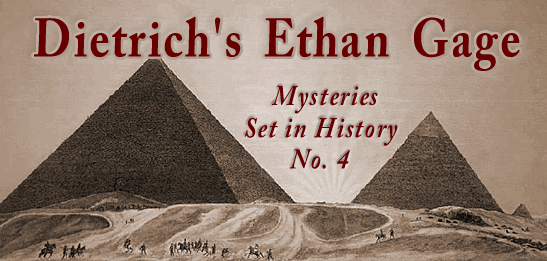




 writer with a pleasant style. But he does his homework thoroughly in terms of both the history and the pseudo-history. I learned about Napoleonís Pyramids because of my interest in historical fiction and adventure tales. It was classified as a mystery with a historical setting, and the same could be said of the three other books in the series. The fact is there are lots of mysteries in Dietrichís Ethan Gage novels and a lot of history as well.
writer with a pleasant style. But he does his homework thoroughly in terms of both the history and the pseudo-history. I learned about Napoleonís Pyramids because of my interest in historical fiction and adventure tales. It was classified as a mystery with a historical setting, and the same could be said of the three other books in the series. The fact is there are lots of mysteries in Dietrichís Ethan Gage novels and a lot of history as well.
